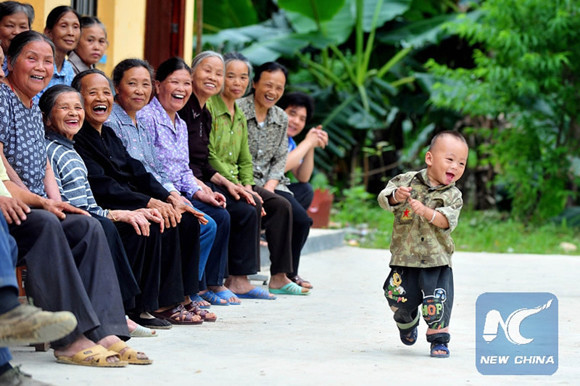
China had more than 230.8 million people aged 60 or above at the end of 2016, 16.7 percent of the total population, according to the Ministry of Civil Affairs. (Photo/Xinhua)
With the largest population on the Earth, China has more mouths to feed and more elderly to take care of than any other countries in the world. Adding to that challenge is the fact that China is aging faster than it's getting rich.
The Chinese government relaxed its one-child policy at the start of last year to allow families to have two kids each. This was done to help counter the effects of the nation's aging population and the shortage of labor force.
In the first five months of 2017, half of all babies born nationwide were second children, bringing extra joy to their families. But not everyone is excited.
A dream come true
Xu Chunmei, a mother in Chengdu in southwest China's Sichuan Province, recently gave birth to a baby girl. The girl has a six-year-old sister. Xu said having a second child had always been her dream, and she had never hesitated when she saw the second-child policy announced.
"I am from the first generation of children born during the one-child policy era in the 1980s," she said. "My parents both have many siblings, and I felt good about that, so when the second child policy was announced, I decided to have another baby. I want my children to feel what I felt ? the affection of a big family."
The second-child policy was implemented in response to the country's graying population and other social issues. The new approach ended China's one-child policy, which was put in place to slow the nation's population growth.
"From the point of view of gynecology, one concerning issue related to the two-children policy is the age of the pregnant women. This can pose problems and risks for the pregnancy, especially if women with scarred uteruses become pregnant," said Lin Yonghong, vice-president of the Chengdu Women and Children's Central Hospital.
"We have taken a variety of considerations to take into account for prenatal screening and diagnosis, as well as paying attention to medical complications and other factors," Lin added.
Experts say 60 percent of women eligible for a second child are at least 35 years of age. They estimate that at least three million women of this age could be expected to fall pregnant between 2017 and 2020. This has resulted in an increased risk of birth defects. It is one of the reasons why many of these older women have given up the idea of having a second child, and there are some who simply do not want another child.


















































